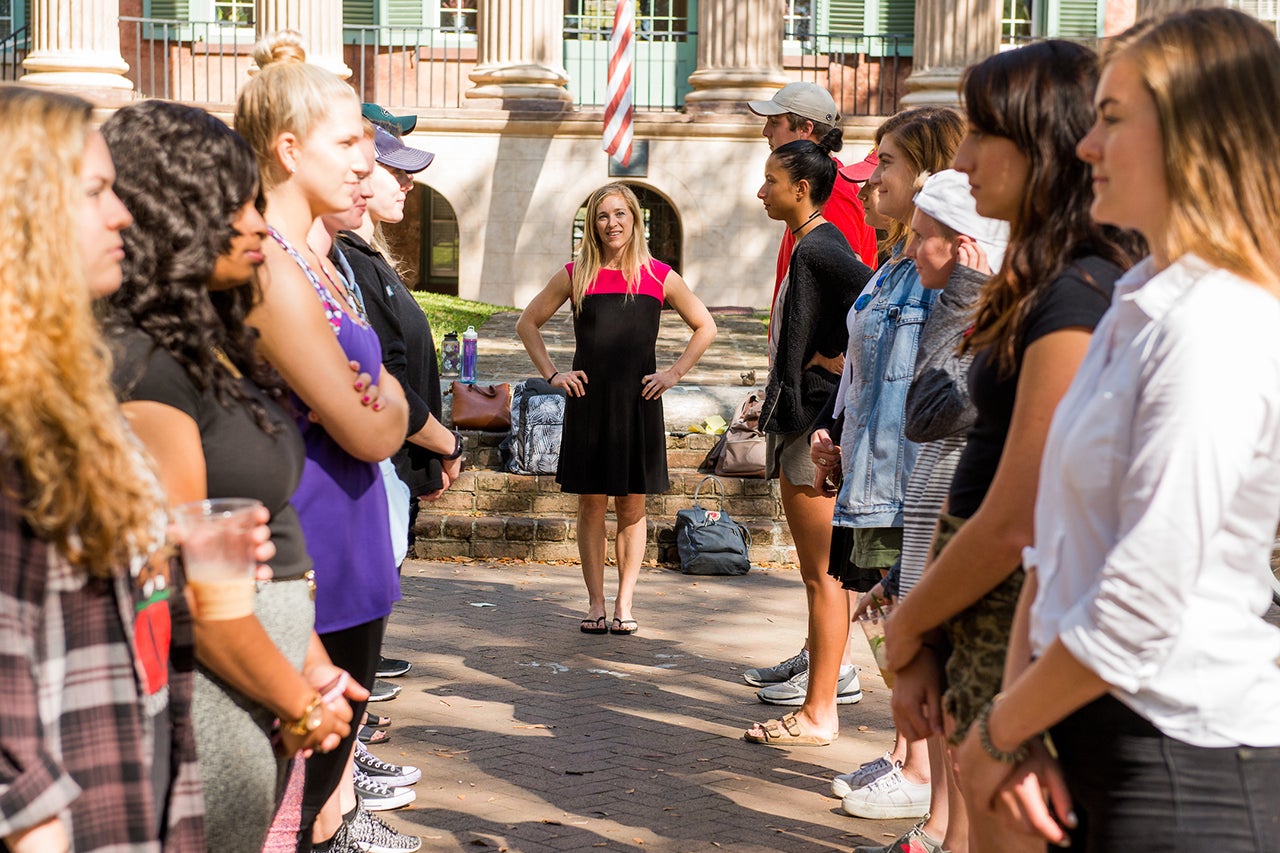by Chloe Field
Wooden beams pierce the sky at James Island County Park’s Challenge Course, each one adorned with ropes dangling above the ground. On any given day, local thrill-seekers strap on helmets and navigate the maze in hopes of getting adrenaline fixes.
That may also be the case for many students in associate professor of communication Merissa Ferrara’s Wired & Inspired capstone class, but working to conquer the obstacle course also carries added weight. It’s the final exam.
“You get to really see people emerge as leaders when the situations calls,” Ferrara says. “It’s interesting to see who takes control, who freaks out and to have something they’ve bonded over through fear.”
Through a series of similarly unconventional assignments, Wired & Inspired stresses the importance of forging connections, testing limits and being vulnerable. Shifting away from the traditional academic essays that structure many upper-level courses, Ferrara’s students instead tackle self-reflection projects, autobiographies, grand gestures and small, two-week challenges.
“The class is simple,” she says. “But it’s not easy.”
Beyond simply encouraging them to uncover their goals and possibilities, Ferrera challenges Wired & Inspired students to shed their self-doubts and take action.
“We do a lot of little things that make them uncomfortable in the hopes that the bigger things will be no big deal,” she says.
Ferrara says the goal of the course is to empower students and build a supportive community. But Wired & Inspired also gives seniors something else she believes they all need: time.
“In middle school, you’re worried about high school. In high school, you’re worried about getting into college. It’s all about picking your major now and deciding things now,” she says. “I wanted this capstone to give them a little bit of time.”
For many seniors, finishing up a degree can also be somewhat of a grieving period. Ferrera says Wired & Inspired can help students come to terms with the impending end of their undergraduate careers and encourage them to look to the future.
“The class is about pushing pause,” she says. “As you leave this student behind, who do you want to be?”
Ferrara says she strives to help her students find ownership over their lives with writing assignments about work, travel and parenthood. The minimal structure of the class offers students room to consider their goals, try new things and — perhaps most importantly — fail.
“Without reflection, you can waste a lot of time and money going down the wrong path,” she says. “For better or worse, this allows them to figure some of that out early on.”
Students’ challenges range in magnitude and form from achieving their wildest dreams to conquering smaller fears that have held them back. From visiting a foreign country to learning to ride a bike, Ferrara’s students have free range to realize their potential.
“And some might say, ‘well that’s not academic,’” she says. “But at the same time, it’s incredibly academic to figure out goals, to do research on how to accomplish them and to have conversations with people around you.”
 While senioritis often strips others of their academic motivation during their final few weeks of classwork, Wired & Inspired students seem to have skated by unscathed.
While senioritis often strips others of their academic motivation during their final few weeks of classwork, Wired & Inspired students seem to have skated by unscathed.
“This class does something right because everybody is still leaning in,” Ferrara says. “I think sometimes people don’t give seniors enough credit.”
Having taught the Wired & Inspired capstone for the past four years, Ferrara will welcome a fresh concept in the fall of 2017: a new capstone titled “Communicating Strength.” Retaining her defining self-actualization concept, this course will introduce a health communication component through goal-setting and healthy-habit development.
“The way I’ve always felt strong is through fitness and nutrition,” Ferrara says. “And I think that if you feel stronger, you feel more capable and it pours out of how you work with people.”
Despite leading multiple capstones in the coming school year, Ferrara says she has the same hope for students taking both courses.
“I want them to feel that they’re wired not only to the school, but to the communication department,” she says. “When they receive those diplomas, I want them to love and cheer for each other, not because they’re friends, but because they were in these capstones.”
Chloe Field is a senior from Pittsburgh studying communication and political science in the Honors College at the College of Charleston. She is also a writing consultant at the Center for Student Learning.






